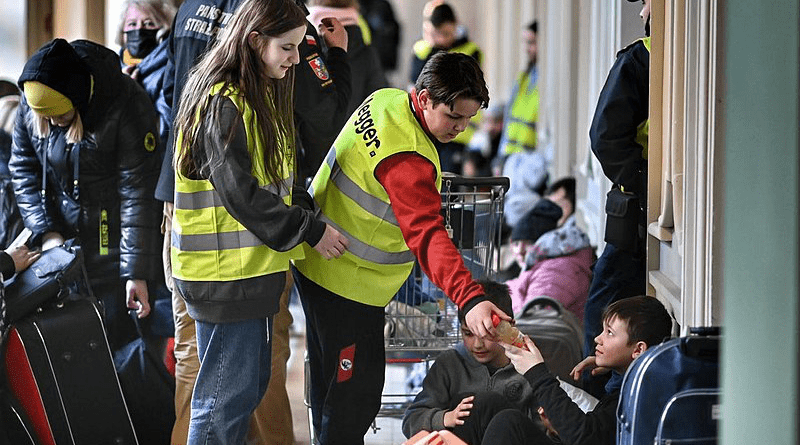Don’t Forget The Refugee Crisis After The Fighting Stops – OpEd
In the time following Russia’s indefensible invasion of Ukraine, over two million people have fled the country according to the United Nations. The lines of refugees at the Ukraine-Poland border stretch for miles. Children cry in the freezing cold as wait times reach 60 hours. Refugees discuss the relatives they had been forced to leave behind—sometimes without knowing whether their loved ones are alive or dead. And the United Nations predicts that these refugees could be followed by millions more—potentially resulting in “the biggest refugee crisis this century.”
As Ukrainians seek safe harbor, they fortunately have received an extraordinary outpouring of support from the international community. The UN Refugee Agency, the International Rescue Committee, and other organizations have sent emergency teams and resources. People around the world, including in Russia, are taking to the streets to condemn the invasion—and donating to organizations offering direct aid to the Ukrainian people.
Though these efforts are vital, they also draw attention to our country’s cruelly inadequate infrastructure for aiding refugees from Ukraine and beyond. Instead of welcoming refugees with open arms, current efforts hold them at arm’s length.
While the United States has offered aid to help other countries welcome Ukrainian refugees, our own annual refugee cap remains at just 125,000. Worse, the United States resettled only about 4,400 refugees in January — a pace well below even the Trump-era annual cap of 15,000.
And the U.S. approach to other recent refugee crises has been abysmal. In Haiti, over the course of just a few months, tens of thousands fled a calamitous earthquake, a deadly tropical storm and an explosive political climate following their president’s assassination. Instead of welcoming these migrants, the United States hounded them, literally chasing refugees at the border on horseback and deporting thousands back to unsafe conditions.
In Nigeria, the Boko Haram conflict has displaced nearly 3 million people over the past 12 years — leaving many malnourished, homeless and sick. The United States has had no trouble offering military and counterterrorism support in the fight against Boko Haram, yet never even offered temporary protected status to the people the terror group has imperiled.
In Syria, the ongoing civil war created the largest refugee crisis of the 21st century so far. After a brief spike in admissions late in the Obama administration, the United States has once again slashed the number of Syrian refugees accepted to the hundreds.
And in Afghanistan, the refugee crisis is in large part a consequence of the United States’ own actions. After waging war on their soil for 20 years, our leaders have allocated $13.3 billion to resettle Afghan refugees — a dismal 0.6 percent of the $2.3 trillion we spent on the war as a whole.
The fact is, too many U.S. institutions are structured to wage war, not foster peace. Our leaders waste trillions to impose America’s will on the world and, as an afterthought, quibble over what tiny fraction of that number should be spent to help those caught in the fallout.
All the while, the United Nations estimates there are 84 million forcibly displaced people around the world, including 26.6 million refugees. And the escalating crisis of climate change is set to cause a wave of refugees unlike anything the world has ever seen. One report from the World Bank estimates as many as 200 million people could be displaced over the next three decades.
Yet as David Miliband, the president and CEO of the International Rescue Committee, reminds us, the refugee crisis is “manageable, not unsolvable.” We know what to do. Take people in. Help them get jobs. Help refugee children — more than half of whom do not go to school — get an education. Support families to get a new start in a new place.
Some claim that this basic decency poses security threats, or costs too much. But while the improper vetting of refugees could indeed pose dangers, refusing to provide aid — and thus leaving masses of desperate people with nothing to lose, some of whom will be enraged at those who contributed to their ruination — creates its own risks.
As for the price: With U.S. military spending at historic peacetime highs — more than 12 times what Russia spends on its military — why is it that the United States can always seem to find the money to intervene in world affairs, but never to help clean up the resulting messes? We would do well to start accounting for the human cost of our interventions before we make them. One way or another, the consequences of our actions will inevitably reach our shores.
If we are to effectively defend against the kind of violence and aggression on display in Ukraine right now, we must also demonstrate what we are for: the right of all people to live in peace. As Miliband says of the refugee crisis, “This is not just a crisis, it’s a test. … It’s a test of our humanity. It’s a test of us in the Western world — of who we are and what we stand for.”
*Katrina vanden Heuvel is the editorial director and publisher of the Nation and is president of the American Committee for U.S.-Russia Accord (ACURA). She writes a weekly column at the Washington Post and is a frequent commentator on U.S. and international politics for Democracy Now, PBS, ABC, MSNBC and CNN. Find her on Twitter @KatrinaNation. This article is distributed by Globetrotter in partnership with The Nation.

